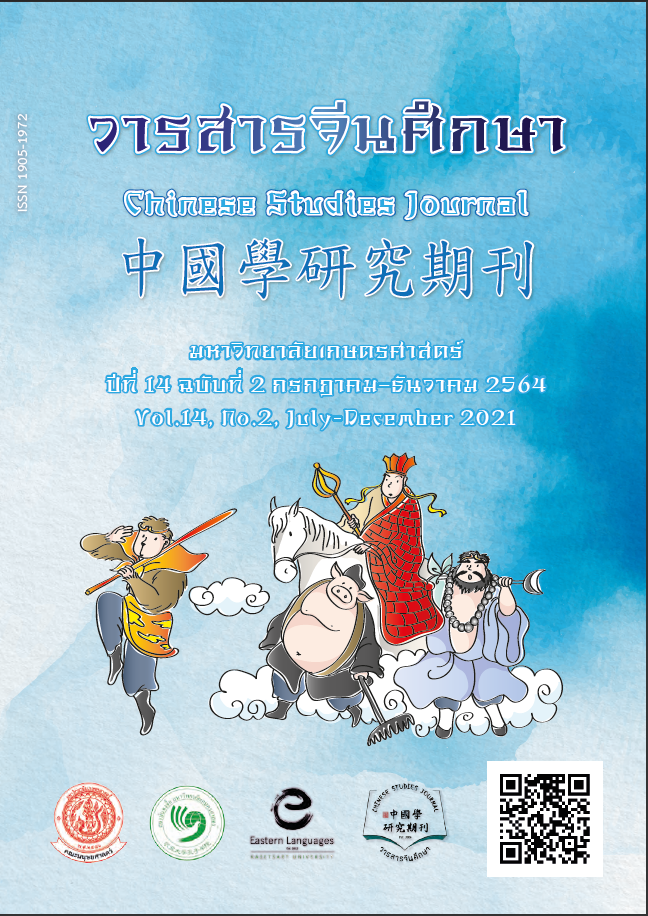An Adaptation of a Chinese School Supported by Mainland China in a Yunnanese Village in the Northern Thailand A Case of Jiaolian High School at Arunothai Village, Chiang Dao District, Chiang Mai Province.
Main Article Content
Abstract
The objectives of this research is to investigate adaptations of Jiaolian High School, which is supported by Mainland China, in a Arunothai Village, a Yunnaese Village in the Northern Thailand, and to study the soft power of China through educational and cultural support to a Chinese School in the Northern Thailand. Qualitative research methods were mainly applied in this research, including a field observation, questionnaires and deep interviews. The research results are, there are 5 adaptation methods operated in Jiaolian High School to be acceptable among villagers: (1) Seeking for allies form Mainland China to develop the school, attracting students form inside and outside the village; (2) Emphasized an active development by school advertised in order to reach the target group; (3) Emphasizing on studying and benchmarking operating result with other educational institutes to be different; (4) Develop the objective-based curriculum and teaching to attract people to see an concrete improvement and; (5) Compensate the community to enable people to understand and approve the school. The following results of the adaptation methods are presented in this paper.
Article Details
ผลงานทางวิชาการที่ลงตีพิมพ์ในวารสารจีนศึกษา มหาวิทยาลัยเกษตรศาสตร์ เป็นลิขสิทธิ์ของผู้เขียนหรือผู้แปลผลงานนั้น หากนำลงในวารสารจีนศึกษาเป็นครั้งแรก เจ้าของผลงานสามารถนำไปตีพิมพ์ซ้ำในวารสารหรือหนังสืออื่นได้โดยมิต้องแจ้งให้ทราบล่วงหน้า แต่หากผลงานที่ได้รับพิจารณานำลงในวารสารจีนศึกษา เป็นผลงานที่เคยตีพิมพ์ที่อื่นมาก่อนเจ้าของผลงานต้องจัดการเรื่องปัญหาลิขสิทธิ์กับแหล่งพิมพ์แรกเอง หากเกิดปัญหาทางกฎหมาย ถือว่าไม่อยู่ในความรับผิดชอบของวารสารจีนศึกษา มหาวิทยาลัยเกษตรศาสตร์ ทั้งนี้ ความคิดเห็นต่างๆ ในบทความเป็นความคิดเห็นส่วนตัวของผู้เขียน ไม่เกี่ยวกับกองบรรณาธิการวารสารจีนศึกษา มหาวิทยาลัยเกษตรศาสตร์
References
จุฑารัตน์ เมืองแก้ว. (2537). การปรับตัวของชุมชนกิ่งเมืองกึ่งชนบทในภาคเหนือ : กรณี บ้านเบ้อ อำเภอหางดง จังหวัดเชียงใหม่. วิทยานิพนธ์ศึกษาศาสตรมหาบัณฑิต สาขาวิชาการศึกษานอกระบบ. มหาวิทยาลัยเชียงใหม่. หน้า 17-18.
ราชบัณฑิตยสถาน. (2549). พจนานุกรมศัพท์สังคมวิทยา อังกฤษ-ไทย ฉบับราชบัณฑิตยสถาน. พิมพ์ครั้งที่ 3, กรุงเทพฯ: ราชบัณฑิตยสถาน. หน้า 9.
สำนักงานราชบัณฑิตยสภา. (2561). พจนานุกรมศัพท์มานุษยวิทยา ฉบับราชบัณฑิตยสภา. กรุงเทพฯ: สำนักงานราชบัณฑิตยสภา. หน้า 1. หน่วยเฉพาะกิจ 327 กองทัพภาคที่ 3. (2530). ผู้อพยพอดีตทหารจีนชาติ. เชียงใหม่: โรงพิมพ์ดารารัตน์.
หยาง ญาณี และคณะ. (2019). เทศกาลสำคัญของชาวจีนยูนนานที่หมู่บ้านอรุโณทัย ตำบลเมืองนะ อำเภอเชียงดาว จังหวัดเชียงใหม่. วารสารมนุษยศาสตร์และสังคมศาสตร์ มหาวิทยาลัยราชภัฏสุราษฎร์ธานี. 11(1): 41-59
อรัญญา ศิริผล. (2561) ปฏิบัติการศาสนา ทุนจิตวิญญาณกับการเมืองวัฒนธรรมจีนในชายแดนไทยภาคเหนือ. รายงานการวิจัย.
Arnole, W. (1980). Crisis Communication. Iowa, Gorsuch Scarisbrook. ใน ไพโรจน์ ภัทรนรากุล. (2546). กลยุทธ์การจัดการและการปรับตัวขององค์การในสภาวะวิกฤต. กรุงเทพฯ: คณะรัฐประศาสนศาสตร์ สถาบันบัณฑิตพัฒนาบริหารศาสตร์. หน้า 15.
陈鹏勇.(2017)“一带一路”战略视域下的华文教育发展研究,《高教 探索》.第6期:100-104.
陈遥.(2010)中国在东南亚的软实力与华侨华人的作用——国际关系和华侨 华人学整合的视角,《华侨大学学报(哲学社会科学版)》第2期,第 82-88页.
达红娟.(2563)孔子学院在泰国的发展研究,วารสารวิชาการภาษาและวัฒนธรรมจีน. ปีที่ 7 ฉบับที่ 1 มกราคม-มิถุนายน 2563. หน้า 19-32.
范宏伟,刘晓民.(2007)中国软实力的培育:当前海外华文教育发展 状况,《南洋问题研究》. 第4期:98-102.
方长平、侯捷.(2017)华侨华人与中国在东南亚的软实力建设,《东南亚 研究》第2期,第137页.
金雅. (2016).《泰北华文民校汉语教学发展现状研究》.天津师范大学硕士 学位论文.
李祺.(2015)泰北云南籍华人融合问题:以美斯乐为例,暨南大学硕士学 位论文.
李如龙、陈燕艺. (2019).东南亚华文教育漫谈.《华文教学与研究》. 第3期,第29页。
魏国彬、周伦. (2013).泰北华人村华文教育的发展变迁——来自泰国金三角地区 的田野调研系列报告之一.《保山学院学报》. 第4期,第1-7页。
杨新新.(2020)台湾当局对泰北山区华文教育援助的演变:“文教帮扶” 与“政治扶持”,《台湾研究集刊》第3期,第102-110页.
杨新新.(2018).经济、社会、文化资本与学校的发展——泰国清莱山区华 文学校的分化探析,《华侨华人历史研究》,第2期,第42-50页.
余义兵、张烨琳. (2021). 论孔子学院发展与中国文化的传播,《蚌埠学 院 学报》,第4期,第117页.
袁神、吴庆悦.(2010).中国和日本软实力比较——基于软实力 系统构建 的视角,《亚太经济》,第6期,第103页.
袁振保.(2012)泰北华人村华文教学调查与研究——以清迈为例,云南 师范大学硕士学位论文.
詹双晖.(2013)东南亚华文教育与我国文化软实力建设略论,《创新》. 第5期,第107-110页.
Joseph. S. Nye Jr. (2012). China and Sopft Power. South African Journal of International Affairs. 19: 89 in黄三生.(2020)约瑟夫·奈关于中美软 实力的比较研究,《文化软实力》. 第4期:31-39.
Joseph. S. Nye Jr. (2011). Soft Power: The Means to Success in World Politics. New York: Public Affairs. 1-32.
Lei, Qili and Chang Dong. (2016). The Difficulties and Possibilities of Cross- Cultural Communication: A Case study of Global Development of the Confucius Institutes. Chinese Education & Society. 49: 402-410.
Lin, Jeng-Yi. (2016). A Study on the State of Development of Higher Education Confucius Institutes from Mainland China. Chinese Education & Society. 49: 425-436.
To, James. (2012). Beijing’s Policies for Managing Han and Ethnic-Minority Chinese Communities Abroad. Journal of Current Chinese Affairs. 41: 183-221.


